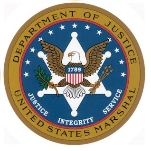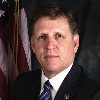The U.S. Marshals Service (USMS) was created by the first Continental Congress in 1789. Marshals were given the power to recruit special deputies (typically local hires or temporary transfers in law enforcement) and swear in posses to help in manhunts. They were charged with assisting federal courts and carrying out orders from federal judges, members of Congress and the President. US Marshals also served subpoenas, summonses, writs, warrants and other documents created by the courts. They made arrests, handled transportation of federal prisoners and disbursed funds according to the dictates of the federal courts. Marshals could also be called upon to pay fees and expenses of the court’s clerks, attorneys, jurors and witnesses, rent courtrooms, procure jail space, hire bailiffs, town criers, and janitors, if necessary. They also made sure everyone was present at hearings, including the prisoners, jurors and witnesses.
Marshals Killed in the Line of Duty
The U.S. Marshals Service (USMS) is responsible for protecting and supporting U.S. courts and the judicial system. Among their court-related duties, marshals search businesses or residences for judicial purposes; seize evidence; make arrests; execute a judgment (deliver a court’s final decision); keep safe all places where federal judicial business is done; protect judges, jurors, witnesses and others from harm; and transport prisoners to and from court, as well as ensure their welfare, with food, access to medical care and humane confinement.
- The Fugitive Investigations program, which ensures that arrest warrants are managed and executed properly, and that escapees, parole violators and those who fail to appear in court are arrested and brought into custody. This sometimes extends to foreign countries where extradition orders are sought and prisoners brought back to the U.S. to face trial.
- The Judicial Security program, which makes sure that federal judges, attorneys, witnesses, jurors and public observers are protected. Responsibilities also include protecting more than 400 federal courthouses and making sure judicial proceedings remain impartial and free form tampering, extortion and bribes.
- The Witness Security program, which is charged with protecting government witnesses and their families, especially when they must testify against dangerous and violent criminals like drug traffickers, terrorist, organized crime figures and other criminals.
- The Prisoner Services program, which helps to obtain services for nearly 44,000 federal prisoners. This often involves shepherding prisoners through the various stages of the court’s procedures, transportation and obtaining medical care if a prisoner becomes sick.
- The Asset Forfeiture program, which gives U.S. Marshals the power to seize and manage property seized by other federal agencies, including the FBI, Drug Enforcement Administration, Customs and Immigration Service and Internal Revenue Service. This power is usually related to cases involving money laundering, drug trafficking and terrorism.
- The Special Operations Support program, which is responsible for providing temporary help to districts suffering from dangerous situations, national emergencies or any other situation deemed important by the U.S. Attorney General or the director of the Marshals Service. The Special Operations Group consists of a highly-trained team of deputy marshals that helps districts respond to high-risk trials, prisoner moves, unusually dangerous arrests and emergency situations where there is a violation of federal law or property.
U.S. Marshals 15 Most Wanted Fugitives
The U.S. Marshals Service spent nearly $3.2 billion on 1,885 contractors this decade. According to USASpending.gov, the Marshals Service paid for a variety of services, from utilities and housekeeping services to transportation, travel and relocation services. The top 10 contractors were as follows:
|
Akal Security
|
$1,398,368,086
|
|
Corrections Corporation of America
|
$273,482,558
|
|
MVM, Inc.
|
$241,698,359
|
|
Tyco International, Ltd.
|
$219,416,604
|
|
The GEO Group, Inc.
|
$90,185,796
|
|
Small Business Consolidated Reporting
|
$90,133,731
|
|
United International Investigative Services
|
$87,754,000
|
|
Aviation Enterprises, Inc.
|
$70,691,020
|
|
USProtect Corporation
|
$68,153,671
|
|
CSI Aviation Services, Inc.
|
$63,851,506
|
Akal Security is a provider of security services for public and private institutions. It has been operational since 1980 and is currently the largest judicial security contractor in the United States. In 2003, Akal was awarded three contracts (
) to provide 1,500 security guards to protect US Army installations at Fort Hood, TX and Fort Stewart, GA. In 2005, Akal received a contract to provide armed guard services at 18 Air Force installations around the country. This contract provided more than 550 guards overseeing
entry control, vehicle inspections and searches, pass and badge verification, control and inspections of commercial traffic, operation of Visitor Control Centers and emergency and crisis response.
Top Contractor Sued
2005 Complaint: Judges Used Marshals Service for Chores (Associated Press)
- Table of Contents
- Overview
- History
- What it Does
- Where Does the Money Go
- Controversies
- Suggested Reforms
- Comments
- Leave a comment


David L. Harlow became deputy director of the U.S. Marshals Service (USMS) in February 2014, a tenure that included a temporary seven-month stint as acting director. USMS is the nation’s oldest federal law enforcement agency, responsible for apprehension of federal fugitives, protection of the federal judiciary, operation of the Witness Security Program, transportation of federal prisoners and seizure of property illegally obtained by criminals.
Harlow, who earned a B.A. degree in law enforcement administration from Western Illinois University, joined the U.S Marshals Service in 1983 as a deputy U.S. marshal. He served the agency as chief deputy for the northern district of Ohio until 2007. In the post, he was deputy commander of operation FALCON [Federal and Local Cops Organized Nationally] III and subsequently commander of operation FALCON 2007, for which he oversaw development of the Northern Ohio Violent Fugitive Task Force and Toledo’s first fugitive apprehension team made up of numerous law enforcement agencies. From 2007 to 2008, he served as chief deputy U.S. marshal for the eastern district of Virginia.
Between 2008 and 2011, Harlow was chief of USMS’s Sex Offender Investigations Branch, for which he oversaw the National Sex Offender Targeting Center and the Sex Offender Apprehension Program. He additionally developed the USMS Behavioral Analysis Unit, which helps target fugitive and non-compliant sex offenders.
In mid-2011, Harlow was named acting deputy assistant director of USMS’s Investigative Operations Division (IOD). Then, in May 2012, he was made assistant director of IOD with a concurrent promotion to USMS’s Senior Executive Service.
From 2012 to 2014, Harlow served as associate director for operations, managing the agency’s Operational Directorate, the responsibilities of which include witness and judicial security; investigative, tactical and prisoner operations; and the justice prisoner and alien transportation system.
Eighteen months into his service as deputy director, Harlow was—on July 26, 2015—appointed acting director of the U.S. Marshals Service. That title expired on February 20, 2016, “in accordance with the Vacancies Reform Act,” according to the U.S. Department of Justice (DOJ). However, on December 21, 2015, the DOJ ordered that Harlow be allowed to retain his position as deputy director until the end of the Obama administration in January 2017.
Harlow and his wife, Lisa, have two sons, Sean and Brian.
-Danny Biederman
To Learn More:
U.S. Marshals Service Balks at Use of Bodycams when they Work with Local Police (by Steve Straehley and Danny Biederman, AllGov)
U.S. Agencies’ Use of Invasive Aerial Cell Phone Surveillance Detailed in Newly Released Documents (by Nathan Freed Wessler, Staff Attorney, ACLU
Speech, Privacy, and Technology Project; ACLU)

- Latest News
- D.C. Public Schools will Teach all Second-Graders to Ride a Bike
- New Rule in Germany Limits Sales of Sex-Themed E-Books to 10pm to 6am
- What Happened to the 6-Year-Old Tibetan Boy the Chinese Government Kidnapped 20 Years Ago?
- U.S. Ambassador to Turkey Photoshops his Hair Color to Mock Turkish Mayor
- Mystery Artist Calls Attention to Unfixed Potholes by Drawing Penises around Them
The U.S. Marshals Service (USMS) was created by the first Continental Congress in 1789. Marshals were given the power to recruit special deputies (typically local hires or temporary transfers in law enforcement) and swear in posses to help in manhunts. They were charged with assisting federal courts and carrying out orders from federal judges, members of Congress and the President. US Marshals also served subpoenas, summonses, writs, warrants and other documents created by the courts. They made arrests, handled transportation of federal prisoners and disbursed funds according to the dictates of the federal courts. Marshals could also be called upon to pay fees and expenses of the court’s clerks, attorneys, jurors and witnesses, rent courtrooms, procure jail space, hire bailiffs, town criers, and janitors, if necessary. They also made sure everyone was present at hearings, including the prisoners, jurors and witnesses.
Marshals Killed in the Line of Duty
The U.S. Marshals Service (USMS) is responsible for protecting and supporting U.S. courts and the judicial system. Among their court-related duties, marshals search businesses or residences for judicial purposes; seize evidence; make arrests; execute a judgment (deliver a court’s final decision); keep safe all places where federal judicial business is done; protect judges, jurors, witnesses and others from harm; and transport prisoners to and from court, as well as ensure their welfare, with food, access to medical care and humane confinement.
- The Fugitive Investigations program, which ensures that arrest warrants are managed and executed properly, and that escapees, parole violators and those who fail to appear in court are arrested and brought into custody. This sometimes extends to foreign countries where extradition orders are sought and prisoners brought back to the U.S. to face trial.
- The Judicial Security program, which makes sure that federal judges, attorneys, witnesses, jurors and public observers are protected. Responsibilities also include protecting more than 400 federal courthouses and making sure judicial proceedings remain impartial and free form tampering, extortion and bribes.
- The Witness Security program, which is charged with protecting government witnesses and their families, especially when they must testify against dangerous and violent criminals like drug traffickers, terrorist, organized crime figures and other criminals.
- The Prisoner Services program, which helps to obtain services for nearly 44,000 federal prisoners. This often involves shepherding prisoners through the various stages of the court’s procedures, transportation and obtaining medical care if a prisoner becomes sick.
- The Asset Forfeiture program, which gives U.S. Marshals the power to seize and manage property seized by other federal agencies, including the FBI, Drug Enforcement Administration, Customs and Immigration Service and Internal Revenue Service. This power is usually related to cases involving money laundering, drug trafficking and terrorism.
- The Special Operations Support program, which is responsible for providing temporary help to districts suffering from dangerous situations, national emergencies or any other situation deemed important by the U.S. Attorney General or the director of the Marshals Service. The Special Operations Group consists of a highly-trained team of deputy marshals that helps districts respond to high-risk trials, prisoner moves, unusually dangerous arrests and emergency situations where there is a violation of federal law or property.
U.S. Marshals 15 Most Wanted Fugitives
The U.S. Marshals Service spent nearly $3.2 billion on 1,885 contractors this decade. According to USASpending.gov, the Marshals Service paid for a variety of services, from utilities and housekeeping services to transportation, travel and relocation services. The top 10 contractors were as follows:
|
Akal Security
|
$1,398,368,086
|
|
Corrections Corporation of America
|
$273,482,558
|
|
MVM, Inc.
|
$241,698,359
|
|
Tyco International, Ltd.
|
$219,416,604
|
|
The GEO Group, Inc.
|
$90,185,796
|
|
Small Business Consolidated Reporting
|
$90,133,731
|
|
United International Investigative Services
|
$87,754,000
|
|
Aviation Enterprises, Inc.
|
$70,691,020
|
|
USProtect Corporation
|
$68,153,671
|
|
CSI Aviation Services, Inc.
|
$63,851,506
|
Akal Security is a provider of security services for public and private institutions. It has been operational since 1980 and is currently the largest judicial security contractor in the United States. In 2003, Akal was awarded three contracts (
) to provide 1,500 security guards to protect US Army installations at Fort Hood, TX and Fort Stewart, GA. In 2005, Akal received a contract to provide armed guard services at 18 Air Force installations around the country. This contract provided more than 550 guards overseeing
entry control, vehicle inspections and searches, pass and badge verification, control and inspections of commercial traffic, operation of Visitor Control Centers and emergency and crisis response.
Top Contractor Sued
2005 Complaint: Judges Used Marshals Service for Chores (Associated Press)
Comments


David L. Harlow became deputy director of the U.S. Marshals Service (USMS) in February 2014, a tenure that included a temporary seven-month stint as acting director. USMS is the nation’s oldest federal law enforcement agency, responsible for apprehension of federal fugitives, protection of the federal judiciary, operation of the Witness Security Program, transportation of federal prisoners and seizure of property illegally obtained by criminals.
Harlow, who earned a B.A. degree in law enforcement administration from Western Illinois University, joined the U.S Marshals Service in 1983 as a deputy U.S. marshal. He served the agency as chief deputy for the northern district of Ohio until 2007. In the post, he was deputy commander of operation FALCON [Federal and Local Cops Organized Nationally] III and subsequently commander of operation FALCON 2007, for which he oversaw development of the Northern Ohio Violent Fugitive Task Force and Toledo’s first fugitive apprehension team made up of numerous law enforcement agencies. From 2007 to 2008, he served as chief deputy U.S. marshal for the eastern district of Virginia.
Between 2008 and 2011, Harlow was chief of USMS’s Sex Offender Investigations Branch, for which he oversaw the National Sex Offender Targeting Center and the Sex Offender Apprehension Program. He additionally developed the USMS Behavioral Analysis Unit, which helps target fugitive and non-compliant sex offenders.
In mid-2011, Harlow was named acting deputy assistant director of USMS’s Investigative Operations Division (IOD). Then, in May 2012, he was made assistant director of IOD with a concurrent promotion to USMS’s Senior Executive Service.
From 2012 to 2014, Harlow served as associate director for operations, managing the agency’s Operational Directorate, the responsibilities of which include witness and judicial security; investigative, tactical and prisoner operations; and the justice prisoner and alien transportation system.
Eighteen months into his service as deputy director, Harlow was—on July 26, 2015—appointed acting director of the U.S. Marshals Service. That title expired on February 20, 2016, “in accordance with the Vacancies Reform Act,” according to the U.S. Department of Justice (DOJ). However, on December 21, 2015, the DOJ ordered that Harlow be allowed to retain his position as deputy director until the end of the Obama administration in January 2017.
Harlow and his wife, Lisa, have two sons, Sean and Brian.
-Danny Biederman
To Learn More:
U.S. Marshals Service Balks at Use of Bodycams when they Work with Local Police (by Steve Straehley and Danny Biederman, AllGov)
U.S. Agencies’ Use of Invasive Aerial Cell Phone Surveillance Detailed in Newly Released Documents (by Nathan Freed Wessler, Staff Attorney, ACLU
Speech, Privacy, and Technology Project; ACLU)

- Latest News
- D.C. Public Schools will Teach all Second-Graders to Ride a Bike
- New Rule in Germany Limits Sales of Sex-Themed E-Books to 10pm to 6am
- What Happened to the 6-Year-Old Tibetan Boy the Chinese Government Kidnapped 20 Years Ago?
- U.S. Ambassador to Turkey Photoshops his Hair Color to Mock Turkish Mayor
- Mystery Artist Calls Attention to Unfixed Potholes by Drawing Penises around Them





Comments